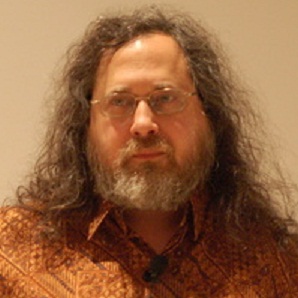

Continued from page 5
Stallman is an outspoken critic of copyright, so we asked him what people in Britain should do to resist the Digital Economy Act.
“I don’t know how to be effective in UK politics, but it seems to me that having protests in front of organisations or in the buildings of organisations that want that law would be a good thing,” he said. “You can pick the ministry that is supposed to enforce it and political parties which voted for it.”
Should this include action normally called denial of service attacks, which Stallman says are simply mass demonstrations in cyber-space? “I don’t know if that is a particularly effective form of protest,” he said. “On the other hand people should, as a duty of resistance, have open wireless networks.”
An open wireless network can be used by anybody, making it impossible for the authorities to track who has done what, he argued. However, in the past this has not stopped the authorities, which fined a pub owner £8,000 for an illegal download by a customer.
“Tyrants love to employ collective responsibility,” said Stallman, who says that securing your own Wi-Fi means you have been “conscripted” to “enforce the tyrants rule over other people.”
The whole object of the Digital Economy Act is wrong he said, as it actually reduces the incentive for the broadband roll-out the government wants to achieve: “Have you noticed how absurd it is to promote the development of broadband in the UK, while prohibiting the main thing it is useful for? “But resistance should go beyond the DEA he said. “People need to explicitly oppose government subservience to the empire of the mega-corporations,” he said. This includes opposing the management of the financial crisis, which “puts the main burden on the public in general when it was the rich – the ‘banksters’ – who created it.”
“Things are just going to get worse until you have a government that is prepared to tell any business, no matter how big, that we will not tolerate the existence in our country of any business that is too big to fail,” he said. “That’s the most important issue of our time: restoring democracy by taking away the political power of business.”
Alongside these issues, Stallman set out his stance for free software and against “open source”, but this is a well-rehearsed argument and more of a philosophical distinction.
“The free software movement is about a political issue, which one addresses – like any political issue – through philosophy,” he said. “Philosophy depends on what your values are, and the free software movement is based on values of freedom and co-operation.”
“The idea of free software is that the users of software deserve freedom,” he said. “Proprietary software does not allow users to have control over their computing. It keeps users divided – because each user is forbidden to redistribute the program to others – and helpless – because they don’t have the source code, they can’t change it and they can’t study it to see what it really does.”
Continued on page 7
As Musk guts US federal agencies, SEC issues summons over Elon's failure to disclose ownership…
Moonshot project Taara spun out of Google, uses lasers and not satellites to provide internet…
Pebble creator launches two new PebbleOS-based smartwatches with 30-day battery life, e-ink screens after OS…
Amazon loses appeal in Luxembourg's administrative court over 746m euro GDPR fine related to use…
Nvidia, xAI to participate in project backed by BlackRock, Microsoft to invest $100bn in AI…
Google agrees to pay $28m to settle claims it offered higher pay and more opportunities…
View Comments
He is my hero
God in disguise form. Avatar of a God. True Legend.
It's sad to see that eweek still supports these bad things even after this interview.